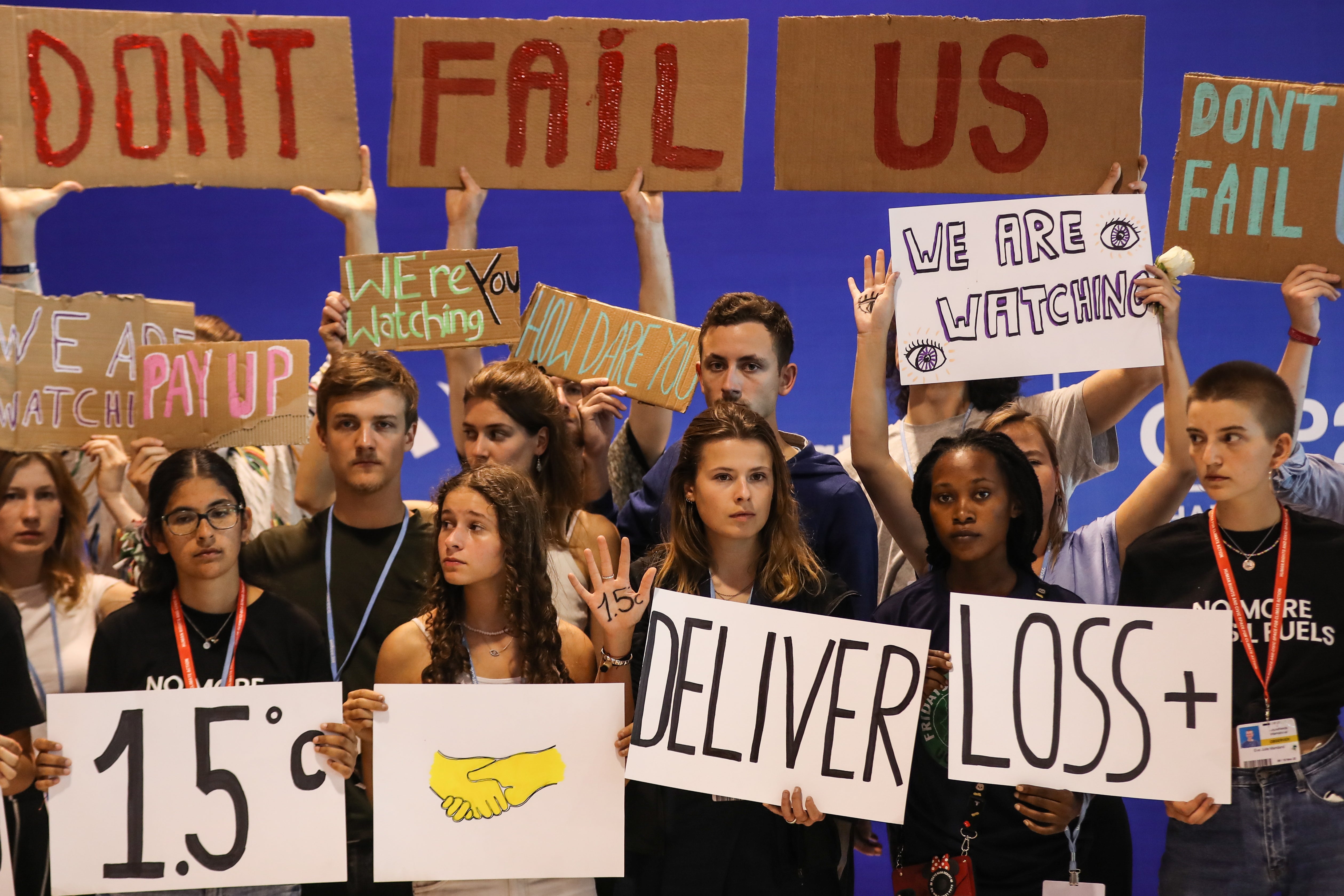Cop27 has delivered a historic agreement against the odds
Editorial: Rich countries were forced to face up to the damage their actions have caused, as vulnerable countries refused to leave Sharm el-Sheikh until there was a breakthrough

In line with tradition, after two weeks of fraught negotiations, the Cop27 climate summit in Egypt went into 36 hours of extra time before a deal emerged on Sunday morning.
In a landmark agreement, the 197 countries present agreed to set up a fund to help developing nations cope with the loss and damage inflicted by the climate crisis. It is a very welcome move, an important building block in the world’s efforts to tackle global heating, and a crucial step towards climate justice.
The summit’s Egyptian hosts deserve credit for forcing onto the agenda an issue that was not on the radar until a few weeks before the meeting. Against the odds, rich countries that opposed the idea – including the US – were forced to face up to the damage their actions have caused, as vulnerable countries refused to leave Sharm el-Sheikh until there was a breakthrough. They duly achieved their goal after a 30-year campaign.
The agreement is only a start. The fund will take at least a year to set up. It remains to be seen how much money it will have, and whether countries such as China and India will pay into it. Developed countries must not backslide on their commitment and must meet their fair share. The omens are not good: the same countries have yet to honour a previous pledge to give $100bn (£84bn) per year to help poorer nations, a target that was due to be met by 2020.
Although the tortuous United Nations-led Cop process is far from perfect, it has delivered. A gulf between the global North and South could have led to disastrous failure, but thankfully this was avoided. However, this 27th conference was again a case of one step forward – on tackling the impact of the climate crisis – and one step back, on addressing its causes.
Regrettably, the summit did not build on the progress made a year ago, at Cop26 in Glasgow, towards limiting the global temperature rise to 1.5C above pre-industrial levels, even though the world is on track for 2.7C.
The language around the crucial target was weak. There was no commitment to ensure that greenhouse gas emissions peak in 2025 to keep the 1.5C target alive, or to phase out the use of fossil fuels entirely. Some countries hide behind the energy crisis caused by Russia’s war in Ukraine to promote “temporary” oil and gas projects and extend the life of coal, exacerbating the climate crisis. The right response is a faster transition to renewable energy, in order to wean countries off their dependency on both fossil fuels and Russia.
There were even attempts by some countries to row back on the agreement in Glasgow that all of them would update their plans to reduce emissions every year. As Alok Sharma, the UK president of Cop26, admitted, the 1.5C target’s pulse is weak, and it “remains on life support”. Next year’s global stocktake might be the last chance to prevent its death.
The urgent need to go further and faster is beyond dispute. Commitments made by individual countries since the Glasgow summit have fallen woefully short of the 1.5C target. The extreme weather episodes in every continent this year, including the floods in Pakistan that cost 1,700 lives and left millions homeless, are happening while the global temperature rise stands at just 1.1C, so things can only get worse.
To keep up to speed with all the latest opinions and comment, sign up to our free weekly Voices Dispatches newsletter by clicking here
The UK has an important role to play. Rishi Sunak has acknowledged that Liz Truss’s disastrous if short-lived premiership caused damage to Britain’s standing in the world, and he is rightly determined to repair it. To do so, the UK will need to show leadership on climate.
So, too, must Mr Sunak personally. His initial instinct was not to go to Sharm el-Sheikh, so his flying visit looked grudging. That was in line with his record as chancellor, when he blocked spending on important measures such as decarbonising homes and buildings.
The prime minister insists he is fully committed to the UK’s net zero target, and told Cop27 that the struggle against climate change must be turned into “a global mission for new jobs and clean growth”.
Mr Sunak must now live up to his words. He should reverse his opposition to onshore wind power. He should help the UK, and the world, to build on the resourcefulness demonstrated during the pandemic, and find the financial commitment and creative solutions necessary to tackle an even more serious emergency. And he must commit to closing the worrying gap between climate science and climate policy.
Join our commenting forum
Join thought-provoking conversations, follow other Independent readers and see their replies
Comments
Bookmark popover
Removed from bookmarks